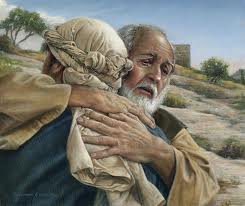The Prodigal Father
 Young and impatient, he had demanded his share of the inheritance while his father still lived. He turned his back on family and home and traveled to a foreign country only to promptly squander his wealth on wild living. Out of money, he quickly found himself abandoned by his opportunistic new “friends” and without resources. Things got worse. A famine enveloped the country, forcing the young man to find employment in the most demeaning of situations: a caretaker of pigs. He endured this for a while, and then one day while enviously watching the pigs eat their slop, he came to his senses. A servant on his father’s estate would get better treatment than what he was experiencing. He threw together what was left of his belongings and headed home.
Young and impatient, he had demanded his share of the inheritance while his father still lived. He turned his back on family and home and traveled to a foreign country only to promptly squander his wealth on wild living. Out of money, he quickly found himself abandoned by his opportunistic new “friends” and without resources. Things got worse. A famine enveloped the country, forcing the young man to find employment in the most demeaning of situations: a caretaker of pigs. He endured this for a while, and then one day while enviously watching the pigs eat their slop, he came to his senses. A servant on his father’s estate would get better treatment than what he was experiencing. He threw together what was left of his belongings and headed home.
Unsure of his reception, he rounded the last bend in the road with trepidation. Soon he was startled to discern the figure of his father running toward him. Gasping from his exertion, the father threw his arms around his wayward son. He called to his servants, “Quick! Bring my finest robe! Bring a ring to put on his finger! Kill the fattened calf and prepare a feast! My son, whom we thought was dead, has returned to us!”
Undoubtedly, this parable told by Jesus is familiar to most of you. We call it “The Prodigal Son.” I always thought the meaning of the word prodigal was akin to wayward, or lost. The other day I was looking up a related word and discovered what prodigal really means. Webster defines it as “characterized by profuse or wasteful expenditure, (then in a more positive tone) yielding abundantly, luxuriant.” While the son was certainly characterized by extravagant spending, we might also say the same of the father upon the son’s return. Nothing was too good for his beloved child. Therefore we might actually refer to the parable as The Prodigal Father.
Luke places this parable in the context of three such stories Jesus told to some Pharisees. They had been criticizing Jesus for his association with tax collectors and “sinners.” In response, Jesus told these parables. The subject of each story was a seeker determined to recover what had been lost to them. A shepherd who lost a sheep, a woman missing a valuable coin, and a father with a wayward son all were meant to picture God as a relentless seeker. None of the main characters stopped searching until what they loved had been found.
We have a Prodigal Father. He is extravagant in his efforts to seek the lost. He is extravagant in the careful attention he pays to us individually: “Indeed, the very hairs of your head are all numbered,” Jesus assured his disciples. His love for us is described as excessive: “See how great a love the Father has bestowed on us, that we would be called children of God!” (1 John 3:1, NASB) His availability to us is beyond our imagining: “Now to Him who is able to do far more abundantly beyond all that we ask or think…” (Ephesians 3:20, NASB). He has supplied all we need and more to live out our relationship with Him in this life. “His divine power has granted to us everything pertaining to life and godliness, through the true knowledge of Him who called us by His own glory and excellence” (2 Peter 1:3, NASB). God’s extravagance marks every part of our relationship with Him.
That extravagance also characterizes His vision for us. It goes beyond what any of us would dream: that we will be “filled to the measure with all the fullness of God” (Ephesians 3:19, NASB). He has extravagant plans in how He intends to use us. We are given the privilege of representing Him to the world at large. Paul wrote the Corinthians that we are God’s ambassadors. Jesus called us light and salt. It is a generous and honored calling, especially in light of the fact it we are faulty and fallible people.
We are called to be the hands and feet of our Prodigal Father. In our interactions with those around us, we are to demonstrate His extravagance by how we love and how we live. The grace and forgiveness we can extend should echo the bounty God has extended toward us. As Christ urged His disciples: “Freely you have received, freely give.”



No Comments